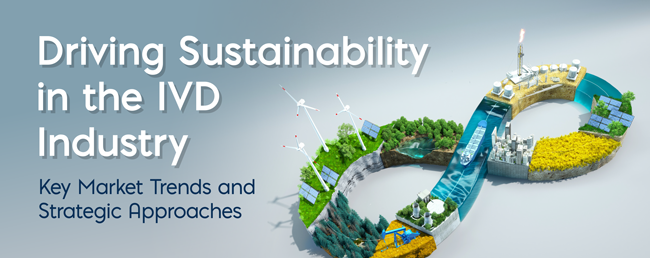Choose a country to view content specific to your location
At Meridian, we believe sustainability starts with us. Throughout our entire organization, we are committed to integrating sustainability principles and ethical practices into our business model. Our goal is to provide innovative, eco-conscious and cost-effective products to our customers, empowering them with solutions to increase global access to their tests, reduce waste, and enhance efficiency in their supply chains and assay workflows as they progress toward their sustainability goals.
With increasing pressure to integrate Environmental, Social, and Governance (ESG) sustainability into their operations, diagnostic manufacturers require innovative solutions in raw materials and reagents to reduce the carbon footprint of diagnostic assays (https://doi.org/10.1021/acs.est.2c04039). In response, Meridian has curated a comprehensive portfolio of eco-conscious and cost-efficient solutions designed to meet specific challenges like:
Meridian’s product development strategy focuses on sustainable, cost-effective solutions. With a robust pipeline of upcoming
product launches, Meridian aims to boost their partners’ competitive advantage while supporting their objectives in attaining a
more ethical and sustainable future. Sustainable innovative solutions start with us.

Diagnostic assays produce 10% of all medical waste, most of which is hazardous and cannot be reused or recycled. This waste comes from the assays themselves, specimen collection, and the shipping and storage of reagents.
Meridian’s innovative master mixes and enzymes achieve waste reduction by providing:

Simplifying assay development and enhancing workflow efficiency can reduce an assay’s ecological footprint and lower costs. Innovative, sustainable solutions offer a competitive edge and reduce CO2 emissions.
Meridian’s innovative master mixes and enzymes improve efficiencies by providing:

Expanding assay accessibility is essential for equitable healthcare. Barriers include high costs, the need for technical expertise or expensive equipment, and supply chain issues like cold-chain requirements.
Meridian’s innovative master mixes and enzymes expand accessibility by providing:

Eco-conscious reagents optimize resource use and minimize hazardous waste, allowing labs to significantly reduce their carbon footprint.
Meridian’s innovative eco-conscious reagents are:

As global awareness of environmental issues grows, industries are re-evaluating their operations to minimize their ecological footprint. Our latest white paper explores how life science companies can adopt sustainable practices by focusing on sustainable materials, process optimization, miniaturization, and multiplexing, all within the framework of green logistics, ethical sourcing, and supply chain sustainability.
Companies in the in vitro diagnostics (IVD) sector can gain significant advantages by embracing sustainability. Market trends emphasize the shift towards green IVDs and eco-friendly diagnostic tests, aligning with stringent EU IVDR regulations to ensure compliance with sustainability standards. Adopting sustainable practices not only fosters environmental responsibility but also positions organizations as leaders in ethical innovation.